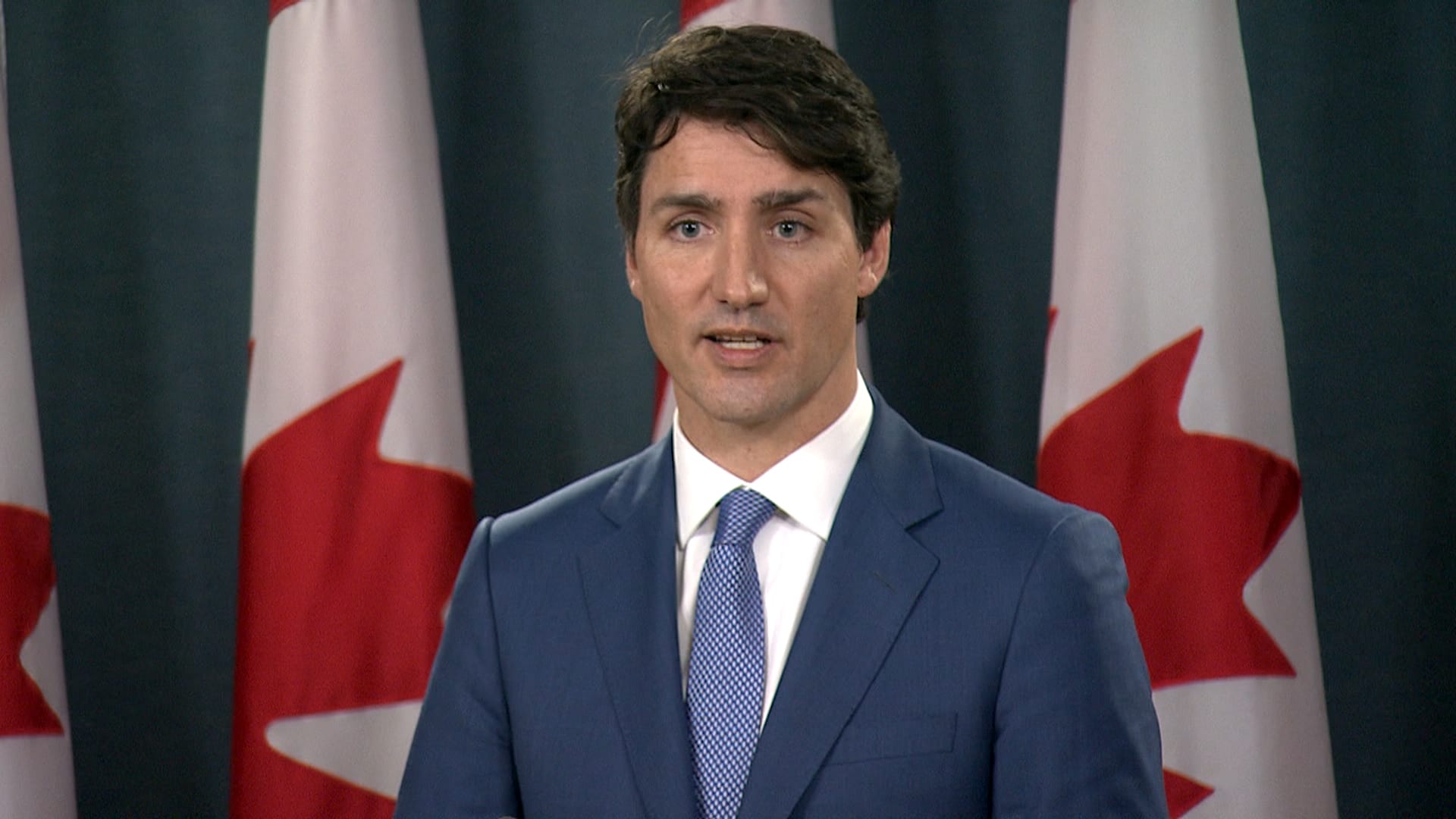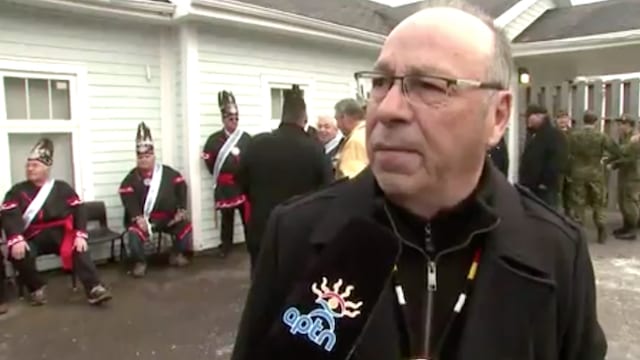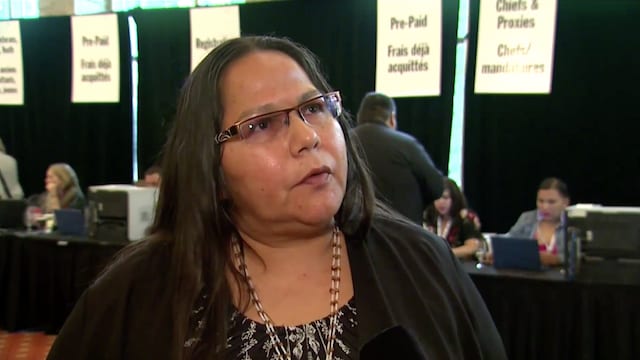
Prime Minister Justin Trudeau gives a press conference about the Trans Mountain pipeline expansion project April 15, 2018.
The deputy grand chief of the Association of Iroquois and Allied Indians says he has a clear message for Canada as he and other leaders from across the country head into the Assembly of First Nations’ Special Chiefs Assembly, which begins in Ottawa today.
“There’s stuff you gotta stop doing right now, because this is not any part of reconciliation,” said Gord Peters.
Prime Minister Justin Trudeau is scheduled to address the assembly Tuesday afternoon, hours after a First Nations youth-led rally on Parliament Hill that’s part of a growing movement to stop the Liberals’ planned Recognition and Implementation of Indigenous Rights Framework.
The government originally hoped to table a framework bill before Christmas in an effort to have new legislation in place by the fall federal election. Now, some are questioning if anything will be tabled by October.
Crown-Indigenous Relations Minister Carolyn Bennett, who will also address the chiefs Tuesday, has said the government won’t rush the framework and wants to co-develop it with Indigenous groups.
But even that prospect seems increasingly unlikely the way things have gone so far.
Meetings earlier this year with Indigenous groups to discuss the proposed sweeping policy and legislative reform barely got off the ground before First Nation leaders and grassroots people began speaking out against the framework plans and the Liberals’ approach to developing it.
In his Valentine’s Day announcement in the House of Commons, Trudeau said a framework would “include new legislation and policy that would make the recognition and implementation of rights the basis for all relations between Indigenous Peoples and the federal government moving forward.”
He said with new legislation and policies in place Canada would “recognize Indigenous governments, and ensure rigorous, full and meaningful implementation of treaties and other agreements.”
But before long suspicion grew as critics noticed a disparity between Trudeau’s promises and the department’s approach during meetings with Bennett as the minister criss-crossed the country to meet with First Nations people.
By the end of summer chiefs were lining up at the AFN’s September framework policy forum in Gatineau, Que. to scorn Bennett.
Leaders said Canada wasn’t listening to First Nations.
An AFN summary report of that forum calls the government’s engagement process a “divide and conquer strategy” and accuses the feds of not being transparent about what it was hearing from First Nations.
According to the report the sessions “fell short of full, fair and meaningful participation and were rushed.”
Association of Iroquois and Allied Indians (AIAI) leaders have unanimously condemned the framework, calling it “a threat to the inherent rights of First Nations.”
They said the government “continues to emphasize the supremacy of the Canadian Constitution and constrains the possibility for true self-determination among First Nations.”
Canada’s approach also undermines the principles of the United Nations Declaration on the Rights of Indigenous Peoples, the AIAI said, adding the engagement process “purposely sidelines important questions of Aboriginal title, consent, treaty obligations, land rights, and access to natural resources.”
In June Ontario chiefs also rejected the framework and called on government to do a “hard reset” on the engagement process.
“First Nations need to be leading the efforts on anything that affects their inherent and treaty rights,” the chiefs said.
Grassroots missing from consultations
Government began engagement sessions on Feb. 16, the day after Trudeau’s announcement.
The government says it has met with approximately 1,662 individuals at more than 100 engagement sessions since February.
Data provided to APTN News by CIRNA shows almost half of the individuals were women, but only around 29 identified as elders and around 90 as youth or students.
The department does note, however, that the figures “may not be perfectly reflective of participation.”
The minister’s office told APTN that 55 individuals participated in the meetings with Mi’kmaq, Wolastoqey and Peskotomuhkati chiefs in February, June and August.
Just one elder participated, according to the department’s records, and no youth.
Asked about the poor representation of elders and youth at the sessions the minister’s office explained in an emailed statement that invitations sent to “Indigenous partners included a direct prompt to the leader of the community-government that ‘Canada is prepared to reimburse eligible travel and related expenditures incurred for up to three individuals per community, with a request that at least one of these individuals be representative of women, youth or Elders.’”
We’koqma’q First Nation Chief Rod Googoo told APTN last week he wasn’t aware leaders were supposed to invite elders.
“You’ve got to send a clear message of who you want to invite,” he said. “Don’t say there was only one elder attended when you don’t notify us you want some elders there too.”
Though the department continued meeting with groups into the fall, the last summary published on its “What We Heard” webpage—intended to keep the public abreast of its work—was six months ago.

We’koqma’q First Nation Chief Rod Googoo said he wasn’t aware Mi’kmaq leaders were supposed to invite elders and youth to the framework engagement sessions, and that chiefs were only given a few days’ notice. File photo.
Last week the minister’s office told APTN more summaries “will be posted shortly.”
At the time of publication the most recent engagement session summary is for the week of May 31.
Bellegarde told APTN in a recent interview that First Nations “took offense” to the government’s approach in engaging with groups.
“It has to be First Nations driven—the rights and title holders to lead this,” he said. “Because it’s only the rights and title holders that will determine the path of decolonization, and as well the path for reconciliation.”
Putting U.N. Declaration ahead of framework
However, the federal Liberal government will continue on multiple fronts to reshape the relationship between Canada and Indigenous people, she said.
Last week Indigenous Services Minister Jane Philpott announced Canada will table legislation in the new year to hand child welfare over to First Nations, Inuit and Metis.
Bennett indicated in an interview with CBC this week that reform is also coming to speed up Canada’s approach to historical claims from First Nations.
All of the government’s policy and legislative changes come as part of its broader effort to transform relations with Indigenous peoples.
As the feds move forward on certain files, some First Nation groups are already putting forward their own proposals for how Canada can engage with them, and what an adequate approach to developing a broader rights recognition and implementation framework would look like.
The First Nations Leadership Council (FNLC) in B.C. has drafted principles and recommendations on how Canada should proceed with First Nations in that province.
The FNLC says any federal rights framework or associated legislation “must be directed at ending Crown denial of the existence of Aboriginal title throughout proper title and rights holders’ — respective First Nations — territories in B.C. Denial must be replaced by recognition throughout Crown legislation.”

Neskonlith Chief Judy Wilson says First Nations in B.C. are working with the province to co-develop legislation to implement the United Nations Declaration on the Rights of Indigenous Peoples. File photo.
While questions linger around how Canada plans to get the provinces on board to hash out what changes to jurisdiction around services and title might look like, First Nations and the Government of B.C. announced last week they will co-develop legislation to fully implement UN Declaration.
Neskonlith Chief Judy Wilson says it’s a step in the right direction.
“It’s all about free, prior and informed consent and self-determination of Indigenous people,” she said, adding it makes more sense to “implement UNDRIP and use that as our framework, than what Minister Bennett was pushing with the recognition and implementation of rights framework.
“If there’s a reset that needs to happen” with the federal government’s efforts to develop an Indigenous rights framework, “then UNDRIP can be a good pathway, a good step in the right direction,” she said.
With files from Angel Moore and Dennis Ward.











Off-reserve status Indians like myself are not included in the Consultation Process. I live in Calgary AB and never resided on the Ermineskin Band in Maskwacis AB. This band has never included me on the band list although I am eligible to be on the band list.
Status Indigenous people like myself who live in urban cities are not included in the consultation process. The Ermineskin Cree Nation in Muskwacis AB refuses to include me in the Band list although I am registered in paragraph 6(1)a. I am 78 years old and will probably live out my days never to be included in my father’s band. I know lots of people like myself who are being neglected. I want to be included in the consultation process as I am as much status Indian as those on the First Nation Bands.
Everything governments do about indigenous people is flawed, even addressing the indigenous is flawed and is in federal policy. We are responsible for identifying ourselves, not the federal government, not any government for that matter.
Canada has no title to any lands in North america.all there canadian trade deals belong too the nations of that territory.we are being swindled.
What an unhelpful comment. Even if you are right – which I dispute – so what? Canada is here; Canadians are here; many first nations did not recognize land ownership; and we need to get along. Get over yourself.
Andrew needs an education to understand the implications of todays society obligations and governments need to exercise these educational responsibilities into the school systems and immigration systems that Canada created. Get over it is not a solution.
Tanisi I am a Swampy Cree woman .registered as a band member in Fisher River. I had to leave my home community to finish high school when I wad 15, I worked all my life as a nurse paying income taxes to the federal government. I retired 6 years ago What I get back from paying income into taxes and Canada Pension. A work pension and OAP is: $809,00 CPP 801,09 work pension 560,00 Old age pension total sum of $2170.00 until I turn 75 , .My rent of $859,00 eats up my work pension. When I turn 75 my work pension stops but my rent continues . Total income at 75 yrs of age will be $1308,00, My rent then will probably be Over $900,00 .
I be living on $400,00 a month that
Is less than what the provincial government gives a single person on social the assistance inc theit y.. Can ‘t tell
m that the federal or provincial government look after its working class people either. Working class people like me an Swampy Cree woman pay income taxe taxes like everyone else in the city to support the programs the both governments provide.. the people. I am not complaining just telling the h truth. I had .to buy back a little piece of land and house to live in while working to raise my family.Buying back the land that was taken from the Indigenous people so many years ago. There is some wrong with this picture. I would say!!! Oh well . Kiyam!! There are over half of the population off my community that live in the city. we are forgotten by our chief and council .The only time we hear from them is when they need votes from us. Kiyam!!! (That is alright) Good things come to people that have patience and wait I will be writing a letter to Mr Justin.Trudeau giving him the numbers of aboriginal people that live in all the big cities in this land of ours where that “we ” are invisible to all levs of governments . i agree that UNDRIP should be the guiding force in developing a franework where the indigenous chiefs can negioatate terms abd refernces for how to move ahead In regards to the 1662 people that were consulted by tge government .that us only .09 % of the total Aboriginal population of Canada Less. .0,09% not even 1 % of the total aboriginall pop.. and only sixteen sessions all across Canada. Sounds fishy to me. Why the big rush? Need ti sit down with yoyr lawyers chiefs before you consider anything the government tries to rush you into an agreement you. Think hard and long * who you are working for?? your people who voted for you. Think eespo nsibly and be accountable to the 1,673780 peoples who fate lies in your hands.
Off-reserve status Indians like myself are not included in the Consultation Process. I live in Calgary AB and never resided on the Ermineskin Band in Maskwacis AB. This band has never included me on the band list although I am eligible to be on the band list.
Status Indigenous people like myself who live in urban cities are not included in the consultation process. The Ermineskin Cree Nation in Muskwacis AB refuses to include me in the Band list although I am registered in paragraph 6(1)a. I am 78 years old and will probably live out my days never to be included in my father’s band. I know lots of people like myself who are being neglected. I want to be included in the consultation process as I am as much status Indian as those on the First Nation Bands.
Everything governments do about indigenous people is flawed, even addressing the indigenous is flawed and is in federal policy. We are responsible for identifying ourselves, not the federal government, not any government for that matter.
Canada has no title to any lands in North america.all there canadian trade deals belong too the nations of that territory.we are being swindled.
What an unhelpful comment. Even if you are right – which I dispute – so what? Canada is here; Canadians are here; many first nations did not recognize land ownership; and we need to get along. Get over yourself.
Andrew needs an education to understand the implications of todays society obligations and governments need to exercise these educational responsibilities into the school systems and immigration systems that Canada created. Get over it is not a solution.
Tanisi I am a Swampy Cree woman .registered as a band member in Fisher River. I had to leave my home community to finish high school when I wad 15, I worked all my life as a nurse paying income taxes to the federal government. I retired 6 years ago What I get back from paying income into taxes and Canada Pension. A work pension and OAP is: $809,00 CPP 801,09 work pension 560,00 Old age pension total sum of $2170.00 until I turn 75 , .My rent of $859,00 eats up my work pension. When I turn 75 my work pension stops but my rent continues . Total income at 75 yrs of age will be $1308,00, My rent then will probably be Over $900,00 .
I be living on $400,00 a month that
Is less than what the provincial government gives a single person on social the assistance inc theit y.. Can ‘t tell
m that the federal or provincial government look after its working class people either. Working class people like me an Swampy Cree woman pay income taxe taxes like everyone else in the city to support the programs the both governments provide.. the people. I am not complaining just telling the h truth. I had .to buy back a little piece of land and house to live in while working to raise my family.Buying back the land that was taken from the Indigenous people so many years ago. There is some wrong with this picture. I would say!!! Oh well . Kiyam!! There are over half of the population off my community that live in the city. we are forgotten by our chief and council .The only time we hear from them is when they need votes from us. Kiyam!!! (That is alright) Good things come to people that have patience and wait I will be writing a letter to Mr Justin.Trudeau giving him the numbers of aboriginal people that live in all the big cities in this land of ours where that “we ” are invisible to all levs of governments . i agree that UNDRIP should be the guiding force in developing a franework where the indigenous chiefs can negioatate terms abd refernces for how to move ahead In regards to the 1662 people that were consulted by tge government .that us only .09 % of the total Aboriginal population of Canada Less. .0,09% not even 1 % of the total aboriginall pop.. and only sixteen sessions all across Canada. Sounds fishy to me. Why the big rush? Need ti sit down with yoyr lawyers chiefs before you consider anything the government tries to rush you into an agreement you. Think hard and long * who you are working for?? your people who voted for you. Think eespo nsibly and be accountable to the 1,673780 peoples who fate lies in your hands.